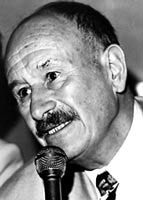‘Neutral’ still a live issue

While David Bernstein only recently discerned the hotly debated practice of ‘media neutral planning’, he realises that he has long-been a proponent of it
Media neutral planning, according to Richard Clayton (Design Business, DW 19 December 2002) ‘is fast becoming an industry buzz-term’. Not with me – until I discovered what it meant and that I had been practising it unknowingly for the past 30 years.
The essence of MNP is objectivity. The solution is not dictated by the medium through which it is assumed it will be communicated. As a young copywriter, I was occasionally concerned that the solution we advocated was determined by the needs, not of the client, but of the agency. But then we were called an ad agency and had agreed an advertising brief with our customer, known as an advertiser. Nevertheless, that didn’t stop me protesting to the account director that the real solution was, say, a promotion, new product development or public relations. I was told the equivalent of ‘shut up and deal’. Get on with the game. Television was trumps, the preferred choice of both the creative director and the finance director. The former could play on a bigger stage, indulge in production values and enhance the agency’s creative status. The latter could benefit from both higher media costs and a healthy production mark-up.
Furthermore, TV involved less effort than, say, a press campaign with different ad sizes and frequent changes of insertion. I began to wonder whose interests we were serving.
Agencies began life serving the media. Newspapers employed intermediaries or brokers to sell space, ie the holes on the page between editorial matter. The broker – later known as the agent – would receive from the newspaper a commission, normally 10 per cent of the price of the space sold which was remitted to the medium, less commission. Within this commission the agent not only booked holes but filled them with copy and images.
Despite the arrival of new media, the system, devised in the mid-19th century, survived intact till the closing decades of the 20th. Supplementary fees were demanded and paid for extra services, such as marketing and research, but the fundamental concept remained, enshrined in the term ‘agency’.
Was there, I wondered, a way of breaking this umbilical cord between media and agent? A new kind of service company maybe which could begin with the client’s marketing communication need and provide the solution determined by the nature of that problem. Advertising would be but one of a candidate list of solutions. Pure consultancy with no strings attached would be another, indeed the initial response.
I decided to have a go. I would provide creative solutions to the marketing communication problems of business. And so began the 20-year history of The Creative Business. We launched in 1972, on 29 February (we don’t happen every year). I was reassured by Clayton’s words last month: ‘Creativity, allied to the understanding of business objectives, remains the most prized commodity’. I was also pleased to note that one of the protagonists of MNP he mentions, Ergo, is run by a TCB graduate.
In 1972 every ad agency had a media department. We wouldn’t. We would charge clients a direct fee for our services. The media tail would not wag the creative dog. Independent specialist media companies had just started. If and when we needed media planning and buying that’s where we would go. The Institute of Practitioners in Advertising, regarding my behaviour as heretical, decided to take away my fellowship.
Thirty years later, separate media companies are the norm. Some began as discrete units. Others were spun off by agencies. The most successful, however, are now part of marketing communications conglomerates such as WPP Group and Interpublic. Yet the term ‘ad agency’ remains, as does the mindset which puts advertisements in pole position. Media neutral planning is an attempt to break habitual thinking. MNP should be seen as a liberating force.
I’ll end with a seasonal example of MNP in action. Johnny, aged seven, gets a Christmas present from his uncle, a PlayStation. Johnny’s mother says ‘You must write a letter to uncle Frank.’ The boy nods, resignedly… what a chore.
Now, had mother practised MNP, she might have said, less prescriptively, ‘Johnny how are you going to thank your uncle?’ Who knows what creative solution he might have come up with?
-
Post a comment



